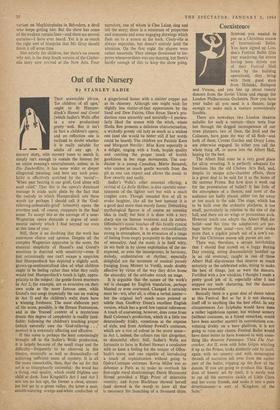Out of the Nursery
By STANLEY SADIE
THAT seasonable phrase, `for children of all ages,' ought to fit Humper- dinck's Hansel and Gretel (which Sadler's Wells offer in a new production) pretty well. But it isn't in fact a children's opera; and on reflection one is inclined to doubt whether it is really suitable for adults of any age. A nursery story, with nursery tunes to match it, simply isn't enough to sustain the interest for an entire evening's entertainment, unless, as in Die Zauberflote, it has some wider or deeper allegorical meaning; and here any such possi- bility is effectively scotched by the `moraf--- `When past bearing is our grief, God alone will send relief.' That this is the opera's dominant message is made quite plain by the fact that the melody to which Humperdinck sets these words (or perhaps I should call it the 'God- relieving-unbearable-grief' leitmotiv) opens the overture and, of course, reappears in the final scene. To accept this as the message of a near- Wagnerian opera demands a degree of senti- mental naivety which I find beyond me even at this time of year.
Still, there is no doubting that the work has enormous charm and aptness. Despite all the complex Wagnerian apparatus in the score, the essential simplicity of Hansel's and Gretel's emotions is depicted with sensitivity—even if just occasionally one can't escape a suspicion that Humperdinck has depicted a slightly arch, grown-up-sentimentalised idea of what children ought to be feeling rather than what they really would feel. Humperdinck's touch is light, appro- priately to the subject: the gentle forest murmurs in Act 2, for example, are as evocative on their own scale as the more famous ones, while Gretel's two songs (especially the one on waking in Act 3) and the children's waltz duets have a winning freshness. The most elaborate part of the score, possibly, is the Dream Pantomime, and in the `framed' context of a mysterious dream this degree of complexity is readily justi- fiable; following the children's touching prayer (which naturally uses the 'God-relieving . . motive) it is extremely affecting and effective.
If this scene is perhaps the least convincingly brought off in the Sadler's Wells production, it is largely because of the small stage and the difficulty—frequently to be observed in this theatre, musically as well as dramatically—of achieving sufficient sense of mystery. It is all the more remarkable, then, that the set for this act is so triumphantly successful: the wood has a living, real quality, which could frighten any child at dusk. Jane Kingshill's Act 1 and Act 3 sets are no less apt, the former a clean, attract- ive but set in a green valley, the latter a neat, mouth-watering orange-and-white confection of a gingerbread house with a sinister copper pot as its chimney. Although one might wish for slightly less matter-of-fact appearances by the Sand and Dew Fairies, Glen Byam Shaw's pro- duction runs smoothly and naturally—I particu- larly liked the scenes with the witch, where Sheila Rex presents a delicious characterisation, a wickedly greedy old lady as much as a wicked one (and she would be better still if her words could be heard). The children are Patricia Kern and Margaret Neville: Miss Kern especially is a delight, singing with a fresh, boyish quality and catching the proper touch of boyish gawkiness in her stage movements. The con- ductor is a young Canadian, Mario Bernardi, who coaxes as much gentle warmth from the pit as one can expect and allows the music to flow sweetly and easily.
Sadler's Wells's other seasonal offering, a revival of La Belle Helene, is also operatic enter- tainment of the lighter sort but with a much tougher core. Though intended first of all to evoke laughter, like all the best humour it is a good deal more than merely funny. Debunking mythological figures is of course an amusing idea in itself; but here it is done with a very sharp eye on human weakness and its nature. Offenbach's music touches off this faintly cynical vein to perfection. It is quite extraordinarily strong in atmosphere, in its evocation of a range of feeling from empty pomposity to the extremes of sensuality. And the music is in itself witty, its wit built in by clever exploitation of the un- expected, or even the incongruous, in harmony, melody, orchestration or rhythm; especially delightful are the moments of musical parody (ranging from Mozart to Verdi), made doubly effective by virtue of the way they drive home the absurdity of the attitudes struck on stage.
It is arguable that the nature of the work's wit is changed by English translation, perhaps blunted or even coarsened. Changed it certainly must be—wit, after all, is often a verbal matter— but the original isn't much more pointed or subtle than Geoffrey Dunn's excellent English version, which has a good few topical references. A touch of coarsening, however, does come from Basil Coleman's production, which is a little too determinedly frisky, sometimes at the expense of style, and from Anthony Powell's costumes, which are a riot of colour in the worst sense— in Act 1, indeed, the colours run riot altogether, to distasteful effect. Still, Sadler's Wells are fortunate to have in Robert Stewart a conductor with so keen a feeling for the temper of Offen- bach's score, and one capable of introducing a touch of sophistication without going to Opera-Comique extremes. Kevin Miller was so debonair a Paris as to make us overlook his first-night vocal shortcomings; Derek Hammond Stroud provided a High Priest of delectable venality; and Joyce Blackham showed herself (and showed is the word) to have all that is necessary for launching of a thousand ships.






























 Previous page
Previous page